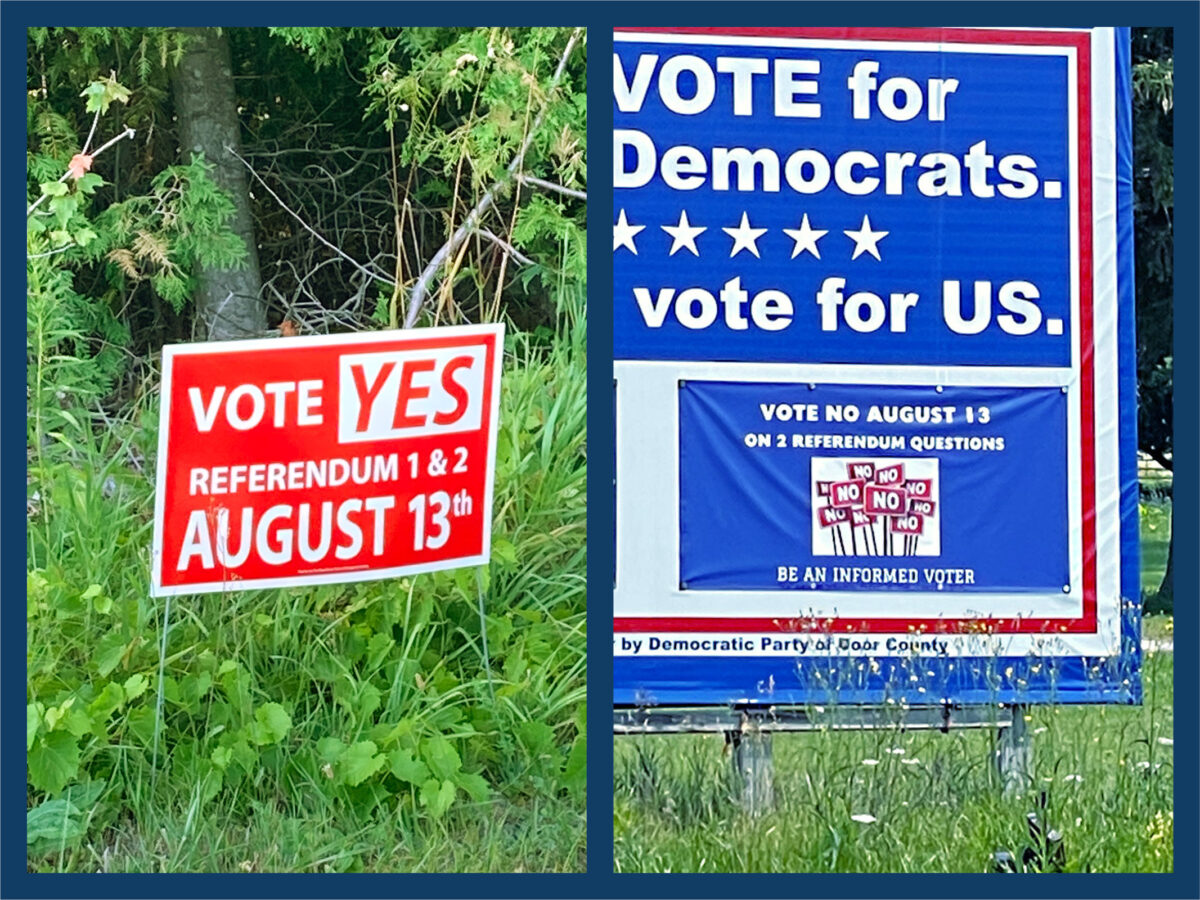Editor’s Note: This story has been updated to include comments from David Helpap, an associate professor of public and environmental affairs at the University of Wisconsin-Green Bay, with additional context on the proposed constitutional amendments.
On the heels of a state referendum that passed in April, prohibiting private funds to be used for election infrastructure and requiring election officials to be designated by law to administer elections, Wisconsin voters will have the choice of whether or not to amend another part of the state’s constitution at the polls on Aug. 13.
In addition to other races, there are two questions posed to voters on the Aug. 13 primary ballot, both seeking to add legislative control to how federal funds are spent in the state. Currently, as a result of legislative action in the 1930s, the governor has the sole power to allocate federal undesignated supplementary funds, without approval from the state Legislature.
The Republican-controlled Legislature spurred the Aug. 13 referendum after billions of dollars in federal Covid relief poured into the state over the past few years. Under current law, Governor Tony Evers was allowed to designate where that funding would go.
Until Covid relief funding, like the American Rescue Plan Act, almost all federal aid was designated for a specific use. Most aid from the federal government comes with requirements on how it is to be spent by the state. The money received by Wisconsin for Covid relief did not have specific requirements for its use. These are considered undesignated funds.
There are two questions on the ballot. The first relates to legislative delegation of power. The second relates to allocation of federal funds.
Ballot question 1: “Delegation of appropriation power. Shall Section 35 (1) of Article IV of the Constitution be created to provide that the Legislature may not delegate its sole power to determine how moneys shall be appropriated?”
Amendment text: “The Legislature may not delegate its sole power to determine how moneys shall be appropriated.”
Ballot question 2: “Allocation of federal moneys. Shall Section 35 (2) of Article IV of the Constitution be created to prohibit the governor from allocating any federal moneys the governor accepts on behalf of the state without the approval of the Legislature by joint resolution or as provided by legislative rule?”
Amendment text: “The governor may not allocate any federal moneys the governor accepts on behalf of the state without the approval of the Legislature by joint resolution or as provided by legislative rule.”
If the first ballot question were to pass with a majority “yes” vote, state lawmakers would not be able to delegate their responsibility for allocating funds to any other body.
If the second ballot question were to pass with a majority “yes” vote, any expenditure of federal money to Wisconsin would have to be approved by the Legislature before the governor could allocate funds.
The proposed constitutional amendment language is broad, however, making it complicated to interpret exactly what the amendments might mean for future situations, according to legal experts.
Supporters of the amendments include traditionally Republican groups, such as the Badger Institute and the Wisconsin Institute for Law and Liberty.
Supporters say the amendments will restore a better system of checks and balances to state government and allow legislators to have a say in how billions of dollars are spent, versus one person having all of the control.
Opponents of the amendments include traditionally Democratic groups, such as the Wisconsin Democracy Campaign, and a few nonpartisan organizations, such as the League of Women Voters of Wisconsin and the Wisconsin Association of Local Health Departments and Boards. (Disclosure: Knock partners with the League of Women Voters of Door County to co-host issue-based community forums.)
Opponents of the amendments say the language is too broad to be passed without more scrutiny, and that, if passed, it will tie up emergency funding in legislative gridlock. Opponents also object to the amendments being on the August primary ballot rather than the November ballot.
Historically, primaries have a low voter turnout, and in this case, only one party has primary races on the ballot, likely leading to a much lower turnout of the other party, according to a letter from representatives of the League of Women Voters of Door County published in the Peninsula Pulse.
“This is not an appropriate way for either party to attempt to amend our constitution,” the letter stated.
State Rep. Joel Kitchens, who represents Door County as part of District 1, said the amendments “would definitely not affect emergency funding, which is their (opponents’) biggest argument.”
Emergency funds such as those from the Federal Emergency Management Agency are already designated and have federal requirements and would not be affected by the amendment change, according to Kitchens.
However, according to David Helpap, the proposed amendments’ language is broad in terms of exactly what kind of federal funding will be affected if the amendments pass. Helpap is an associate professor of public and environmental affairs at the University of Wisconsin-Green Bay. His academic focus includes state and local government, and public budgeting and finance.
Categorical grant funds are already very specific as far as how they must be spent. Funding in the form of block grants and relief money is more open to interpretation for how it can be used by the state, Helpap said, and right now, those are the kinds of funds the governor can allocate without legislative approval.
However, if the amendments pass there are no guarantees as to exactly what kinds of funding will be affected, Helpap said. Covid relief funds were really general in terms of designation, he said, and the Legislature wasn’t happy Evers got to assign those funds.
The state Legislature initially tried to pass a bill that gave it more of a say in how federal funds are allocated, and Evers vetoed it last year. Now it has moved to a referendum for the Aug. 13 primary.
“The Wisconsin Legislature and the governor have not gotten along in the last few years,” Helpap said, “and now we have a (state Supreme Court) with different partisanship. Precedent tells us the Legislature is using this to get around the governor’s veto authority.”
“I think sometimes how things are worded is by design,” he said, referring to the broad amendment language. Ultimately it is up to the voters to decide on the merits of the amendments, he added.

